Mount Fanjing, the peak of the Wuling Mountains, with an altitude of 2,572 meters, is located at the junction of Jiangkou, Yinjiang, and Songtao counties in Tongren City, Guizhou Province, with a total area of 775.14 square kilometers. Fanjing Mountain is one of the most well-protected subtropical forest ecosystems in China, and it is the largest primary forest in Guizhou Province. The area has been designated as a national nature reserve and is now on the UNESCO World Natural Heritage List.
Fanjing Mountain is the only habitat for Guizhou snub-nosed monkeys, with many precipitous cliffs, strange rocks, surging spring streams, dense virgin forests, and more than 7,100 species of wild animals and plants, including ancient and rare tree species such as crape myrtle and chinese dove tree.
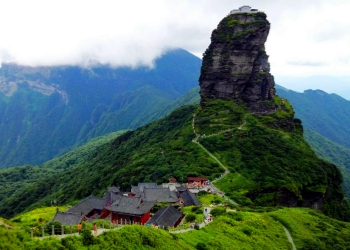
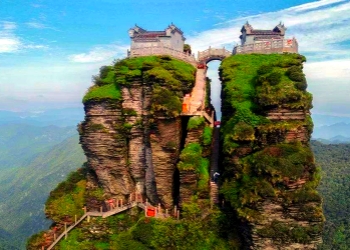
Geomorphic Feature
Fanjing Mountain is a typical domed mountain ecosystem with spectacular subalpine and hilly landforms. Fanjing Mountain is located in the middle of the central subtropical zone and the transition of Yunnan-Guizhou Plateau and Xiangxi hills, with a height difference of 2000 meters. The main part of the Fanjing Mountain area is unique erosion-tectonic landforms, such as unique canyons and valleys nivation depressions, and other paleoclimatic landforms. The outer are typical of karst landforms and fluvial landforms.
Climate
The Fanjingshan region is influenced by the Southeast Asian Pacific monsoon and falls within the subtropical humid monsoon climate zone. During the summer, it experiences significant impact from the southeast oceanic monsoon, while in winter, the influence of cold waves is generally minor. Overall, the climate is mild, with abundant solar radiation and rainfall, and is free from extreme cold or heat.
What to See at Fanjing Mountain
Red Clouds Golden Summit (红云金顶)
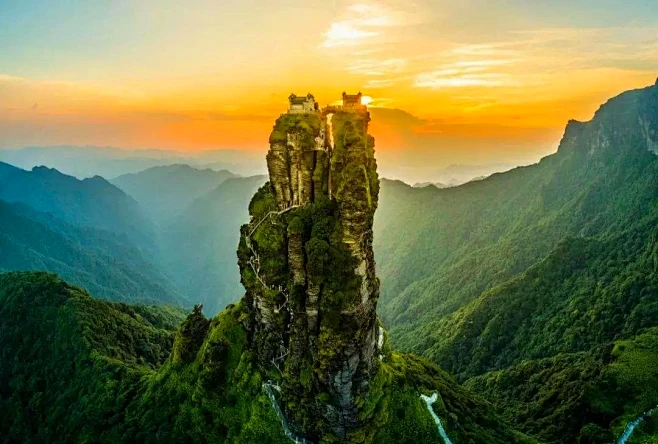
Described by UNESCO as an "island of metamorphic rock in a sea of karst," the Thumb-like peak of Fanjingshan is a geological marvel believed to have emerged between 2 million and 65 million years ago. The primary attraction of Fanjingshan lies in the breathtaking views from its summits. Notably, there are three summits, with the Red Cloud Golden Summit being the most iconic. Rising to a majestic height of approximately 2336 meters above sea level, this peak resembles a towering thumb.
The summit's distinct feature is its bifurcation, with the upper half split into two sections connected by a bridge known as the Tianqiao. Each side of this divide is adorned with a temple, one dedicated to Sakyamuni Buddha and the other to Maitreya Buddha, symbolizing the harmonious coexistence of diverse beliefs.
At sunset or sunrise, the summit is transformed into a magical scene. The overhead red-tinted clouds envelope the entire peak, creating a stunning visual display. In Chinese, "Hongyun" (Red Cloud) also connotes "Good Luck" (Pinyin: Hongyundangtou, meaning "Good Fortune at the Forehead"), and the summit is aptly named after this auspicious phenomenon.
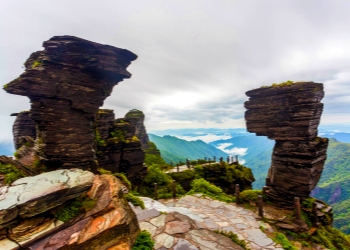
Mushroom Stone (蘑菇石)
As the name suggests, the mushroom stone is shaped like a mushroom, big on the top and small on the bottom. The mushroom stone, about 10 meters high, stands on the edge of Fanjing Mountain. After a billion years, it has become one of the iconic attractions in Guizhou. The mushroom stone has also become the subject of many artists' works because of its unique shape and geographical location.
Mushroom stone appears fragile but has stood for millions of years despite erosion. This resilience and endurance echo the Buddhist principle of "Remain unbiased" in all situations.
Old Golden Summit (老金顶)
The Old Golden Summit, stands at an imposing elevation of 2,494 meters, neighboring the captivating Mushroom Stone. A unique feature of the Old Golden Summit is its rock texture. Under the silvery glow of the moon, the ancients could discern their reflections in the rock's surface, akin to a mirror. This phenomenon has earned the summit the enchanting moniker of "Moon Mirror Mountain,"
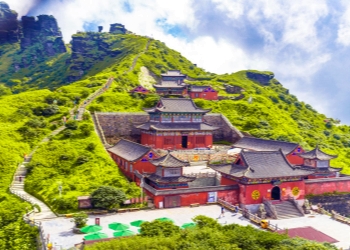
Cheng En Temple (承恩寺)
Nestled between the two peaks, Cheng En Temple stands proud with its scarlet walls and black tiles, exuding an aura of dignity and antiquity. As the central edifice of the Fanjingshan Temple Group, it holds a prestigious position among the four Royal temples that dot the scenic landscape of Fanjing Mountain. It was originally constructed during the Ming Dynasty.
Best Time to Visit Mount Fanjing
In terms of weather and seasonal conditions, the optimal time to visit Fanjingshan is between March and November, with spring and autumn being particularly enchanting seasons. However, it's important to keep in mind that during periods of thunderstorms or heavy snow, the cableway and summit areas may be closed for safety reasons. Therefore, when planning your trip to Fanjingshan, it's crucial to consult the calendar and weather forecast to ensure a smooth and enjoyable experience.
Travel Tips
Address: Fanjingshan Scenic Area, Jiangkou Country, Tongren, Guizhou
Best Seasons: Spring, Summer and Autumn
Recommended Visiting Time: 5 - 10 hours
Opening Hours: 8:00AM - 18:00PM (19:00PM in Peak Season from March to November)
Tickets: CNY 100
Scenic Spot Level: National AAAAA Tourist Attraction
Climate: Subtropical mountain monsoon climate




































